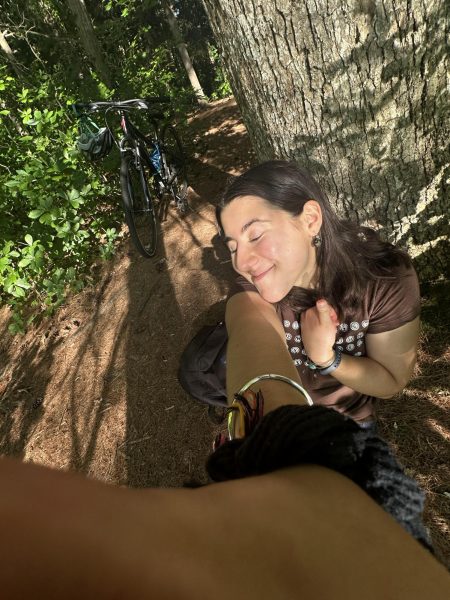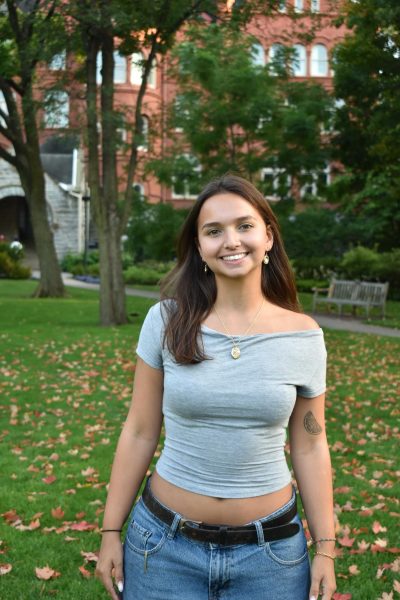Note: This article is based on information available as of 5 p.m. on Wednesday, Dec. 4 and on interviews conducted on and before Tuesday, Nov. 26. The likely hearing between MUWU and Macalester would take place on Friday, Dec. 6, the publication day of this issue of the The Mac Weekly.
Following a nearly year-long drive to get union cards signed, several organizers of the Macalester Undergraduate Workers’ Union (MUWU) — with the union cards of a majority of Macalester’s student workers — walked into the Minneapolis National Labor Relations Board (NLRB) office on Monday, Nov. 25, and officially filed for an election.
“This has been [around] two years in the making, and it’s going to be … at least another year-and-a-half before we probably win a contract,” Roxy, a co-founder of MUWU who attended Macalester for two years and requested to be identified only by her first name, said. “But this is the huge step. Everyone who’s ever been involved in the campaign, whether you signed a card or whether you signed a solidarity petition, should feel solace and [that] it’s huge. … We got a majority of student workers to support a union, and that is a huge feat.”
The union is far from formed, however. Macalester and MUWU have yet to come to a stipulated agreement: a consensus that allows an election to be held. This makes it all but certain that the two parties will face an NLRB hearing on Friday, Dec. 6.
MUWU and Macalester have yet to agree on three conditions: the logistics of the election, the conditions of voter eligibility and the scope of MUWU’s bargaining unit. Election logistics include the date, time and location of the election.
The tossup over voter eligibility involves whether the voter rolls will be made up of those on the payroll in the pay period immediately preceding the date of filing for election, which is a common practice. MUWU members argue that eligibility should instead be given to workers who were on the payroll in the pay period immediately preceding the election itself. They believe that this option is better suited to undergraduate unions, as it accounts for payrolls shifting as students switch jobs or depart for and return from studying away.
The source of the most disagreement is the scope of MUWU’s bargaining unit. MUWU is committed to including all student workers in the union, but Macalester has argued that stipended and off-campus workers, such as RAs and Bonner scholars, should be excluded from the bargaining unit because their jobs are too different from those of other student workers. Macalester also has concerns about what the implications of including off-campus workers in the bargaining unit would be.
“The election process should make clear that unionizing may mean we have to stop allowing work study positions at organizations off campus because it may not be possible to fully control working conditions at entities outside the college,” President Suzanne Rivera wrote in an email to The Mac Weekly.
MUWU rejects the idea that their intent to include stipended and off-campus student workers in their bargaining unit would necessitate an end to off-campus student employment.
“It is not our responsibility to figure out how administration should monitor the working conditions of off-campus employees,” MUWU organizer Henna Schecter ’26 wrote in a text to The Mac Weekly. “We hope to make it not just their responsibility, but their legal obligation, to ensure that the off-campus job opportunities they choose to partner with are providing Macalester students with acceptable working conditions, as defined in a future contract.”
“If they decide that off-campus employment is no longer feasible under these terms, as they have threatened to do, then it is their responsibility to provide other employment opportunities to take its place,” Schecter continued. “Claiming that we are forcing their hand when it comes to taking away off-campus employment opportunities misrepresents our intentions. If they are unable to guarantee satisfactory working conditions with the organizations that they partner with off-campus, then that is an issue that they should be working on regardless of what we demand in a contract.”
Macalester has indicated that they want all communication about the terms of the election, voter eligibility and bargaining unit to go through the case’s NLRB agent, as opposed to discussing these topics with MUWU directly. Although parties formulating stipulated agreements often communicate only through their NLRB agent, MUWU organizers believe that this indirect form of communication will not lead to a stipulated agreement in this situation and will instead guarantee a hearing.
“Mac is making even [communication] difficult and very clearly forcing us into an official hearing,” Schecter wrote in a direct message to The Mac Weekly.
In the likely hearing, MUWU and Macalester would present arguments and call witnesses to defend their idea of what election logistics, voter eligibility and the bargaining unit should be. Unless the two parties come to an agreement during the hearing, the NLRB regional director will establish the terms of these three contested areas, as well as whether there will be an election to decide whether to unionize. Depending on when a hearing decision is released, the election could be delayed.
In an election, eligible student workers would vote on whether they want to be represented by a union. If over half of the workers who participate in the election vote in favor of a union, and if no party moves to challenge the outcome of the election, Macalester’s student workers will be unionized, and MUWU will be a legal entity.
Rivera thinks that student workers should get to vote on whether to unionize, rather than being in a union that was formed without their input. Under this belief, she did not voluntarily recognize the union this past summer.
“I would have appreciated the opportunity to address student worker’s concerns informally but, if students vote to form a union, I will — of course — negotiate working conditions in good faith,” Rivera wrote. “I did not recognize the union voluntarily without an election because I believe student workers should have the right to vote on whether they want to be represented by a union. … I think all student workers should get to decide whether they want a union to negotiate the conditions of their student employment work.”
MUWU organizer Eliot Berk ’26 sees a need for a student worker union at Macalester, and believes unionization would have an important impact.
“I personally believe that there should be unions everywhere and that all workers should be unionized,” Berk said. “At this point at Macalester, students, especially student workers, deserve a union, and we deserve better. We deserve more of a say in the way that we work and in the things that are being asked of us, and we deserve more consistency in those things. We deserve a lot of things.”
If voted into existence, MUWU would be the first undergraduate union in Minnesota and one of the largest undergraduate unions in the country. In order to achieve this, however, MUWU has to get through the hearing and the election.
Berk named the uncertainty — and the strength — of the moment MUWU finds itself in.
“The bottom line is that even if we lose the election, even if … any of these things happen, we, at the end of the day, have built a strong organizing committee,” he said. “A majority of student workers have said that they want a union, and we can still give that to them regardless of if we’re legally recognized or not. I think that’s the beautiful thing about a union, is that we can still do things regardless. Obviously, if things don’t work out the way we want it to, there would be more roadblocks, but we absolutely would not stop fighting, and we would not stop talking to people and trying to make things [as] better as we can until we can get that legal recognition.”












